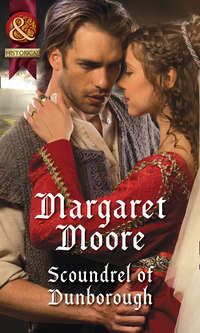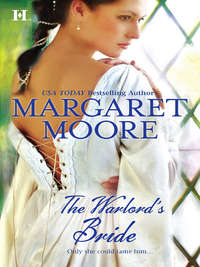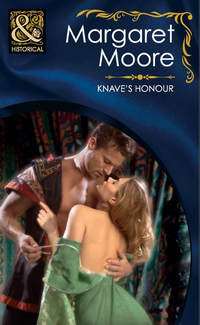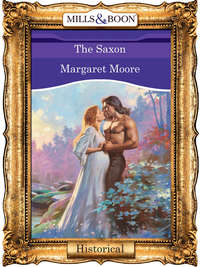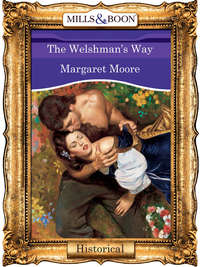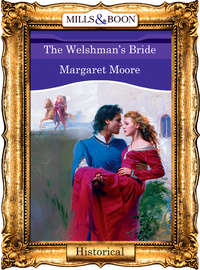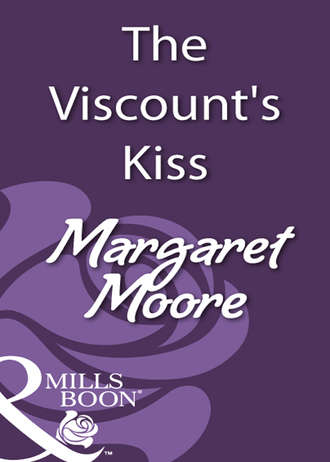
Полная версия
The Viscount's Kiss
Pirate. The sea. A viscount who liked spiders who’d gone to sea…
Good heavens! He had to be Lord Bromwell, the naturalist whose book about his voyage around the world had made him the toast of London society and the subject of many articles in the popular press. Like so many others, Lady Sturmpole had bought his book and talked about his remarkable adventures, although she didn’t bother to actually read The Spider’s Web.
No wonder he could be calm in a crisis. Any man who’d survived a shipwreck and attacks by cannibals could surely take an overturned coach in stride. As for that kiss, he must often be the object of female attention and lust. He probably had women throwing themselves at him all the time and assumed she was another who was intrigued and infatuated by his looks and his fame.
And because he was famous, the press might take an even greater interest in a mail coach overturning, perhaps noting that Lord Bromwell had not been the only passenger and asking her name and her destination and why she was in the coach….
With a growing sense of impending doom, wishing she’d never caught the coach, never gone to London, never decided to go to Bath and, most of all, never met him, Nell watched as the handsome, renowned naturalist swung himself onto the back of one of the horses and galloped down the road.
Chapter Two
Fortunately, I have been blessed with a practical nature that allows me to take immediate action without the burden of emotion. Thus, I was quite calm as the ship was sinking and my concern was to help as many of my shipmates as possible. It was after the ship had gone down and the storm had abated, after we had managed to retrieve some items necessary to life and found ourselves on that tiny slip of sand seemingly lost in the vast ocean, that I laid my head on my knees, and wept.
—from The Spider’s Web, by Lord Bromwell
As Lord Bromwell—known as Buggy to his closest friends—had expected, the sight of a dishevelled, hatless, cloakless man mounted on a sweat-slicked coach horse charging into the yard of The Crown and Lion caused quite a stir.
A male servant carrying a bag of flour over his shoulder toward the kitchen stopped and stared, openmouthed. Two slovenly attired men lounging by the door straightened. The washerwoman, an enormous basket of wet linen in her arms, nearly dropped her burden, while a boy carrying boots paid no heed where he was going and nearly ran into one of the two idlers, earning the curious lad a cuff on the side of the head.
“There’s been an accident,” Bromwell called out to the hostler as the man ran out of the stables, followed by two grooms, a stable boy and a man in livery.
Bromwell slid off the exhausted horse and, after unwrapping the excess length of the reins from around his hands, gave them to the stable boy. Meanwhile, the grooms, liveried fellows, idlers, bootblack and washerwoman gathered around them. “The mail coach broke an axle about three miles back on the London road.”
“No!” the hostler cried, as if such a thing were completely impossible.
“Yes,” Bromwell replied as the inn’s proprietor, alerted by the hubbub, appeared in the door of the taproom. He wiped his hands on the soiled apron that covered his ample belly and hurried forward at a brisk trot that was impressive for a man of his girth.
“Gad, is that you, Lord Bromwell?” Jenkins exclaimed. “You’re not hurt, I hope!”
“I’m perfectly all right, Mr. Jenkins,” the viscount replied, slapping the worst of the mud from his trousers. “Unfortunately, others are not. We need a physician and a carriage, as well as a horse for me, for I fear we won’t all fit in one vehicle. Naturally I shall pay—”
“My lord!” Mr. Jenkins cried, his red face appalled, his hand to his heart as if mortally offended. “Never!”
Bromwell acknowledged the innkeeper’s generosity with a smile and a nod. He’d always liked Mr. Jenkins, which made his father’s disparaging treatment of him even more painful to witness.
“You there, Sam,” Jenkins called to the hostler, “get my carriage ready and saddle Brown Bessie for his lordship—the good saddle, mind.
“Johnny, leave those at the door and run and fetch the doctor,” he said to the bootblack. “Quick as you can, lad.”
The boy immediately did as he was told, while the hostler and grooms returned to the stable, taking the coach horse with them. Adjusting her heavy basket on her hip, the washerwoman started back toward the washhouse and the two idlers returned to their places, where they had a good view of incoming riders and vehicles.
“Come in and have a drink o’ something while they’re getting the horse and carriage ready,” Jenkins offered. “I expect you’ll want to wash, too.”
Bromwell reached up to touch his cheek and discovered he was rather muddy there, too. “Yes, indeed I would,” he replied, following the innkeeper toward the main building, a two-storied, half-timbered edifice, with a public taproom and dining room on the lower level and bedrooms above.
Although Bromwell had lost what vanity he’d possessed years ago, believing his looks nothing to boast of especially compared to those of his friends, as he walked behind Jenkins through the muddy, straw-strewn yard, he couldn’t help wondering what his female fellow passenger had made of his appearance.
More importantly, though, what the devil had possessed him to act like a degenerate cad? To be sure, she was pretty, with the most remarkable green eyes, and he’d noticed her trim figure clad in a plain gray pelisse when she’d briskly approached the coach before getting on in London. But he’d met pretty young women before. He’d even seen several completely naked during his sojourn in the South Seas. Indeed, while he’d found her pretty, he’d had no trouble at all pretending to be asleep to spare himself any conversation before he really had fallen asleep.
If he hadn’t, he might have started to wonder sooner why a woman who spoke with such a refined accent and had such a manner was travelling unaccompanied.
She could be a governess or upper servant, he supposed, going on a visit.
Whoever she was, he should be thoroughly ashamed of himself for kissing her—and he would have been, had that kiss not been the most amazing, exciting kiss he’d ever experienced.
“Look here, Martha, here’s Lord Bromwell nearly done to death,” the innkeeper announced as he entered the taproom and addressed his wife, who was near the door to the kitchen. “The mail coach overturned.”
Mrs. Jenkins, round of face and broad of beam, gasped and bustled forward as if about to examine him for injuries.
“No one has been killed or seriously hurt, as far as I can determine,” Bromwell quickly informed her. “Your husband has already sent for the doctor and has offered replacement transportation.”
“Well, thank God nobody was badly hurt—and ain’t I been sayin’ for years them coaches were gettin’ too old to be safe?” Mrs. Jenkins declared, coming to an abrupt halt and resting her fists on her hips. She frowned at them as if they were personally responsible for the mishap and had the authority to correct everything and anything amiss with the delivery of the Royal Mail.
“Aye, Mother, you have,” her husband mournfully agreed, agreement being the best way to react to Mrs. Jenkins’s pronouncements, as Bromwell had also learned over the years. “Have Sarah bring some wine to the blue room while Lord Bromwell cleans up a bit—the best, o’ course. He’ll need it.”
“There’s clean water there already and fresh linen, my lord,” Mrs. Jenkins said briskly as she turned and disappeared into the back of the inn.
“She’s right, though,” Jenkins said as he continued to lead the way, even though Bromwell was as familiar with this inn as he was with the ancestral hall. “Them coaches are a disgrace, that’s what.”
Bromwell remained silent as they passed through the taproom, although several customers turned to stare at him and excited whispers followed in his wake.
It was not just because of the accident or his dishevelled appearance, for he heard them uttering his name and, as was all too usual, the words shipwreck and cannibals.
He was never going to get used to this sort of curious scrutiny and the agitation occasioned by his mere arrival in a room, he thought with an inward sigh. Although he was glad his book was a success and increasing interest in the natural world, it was at times like these that he longed for his former anonymity.
Had the young lady in the coach known or guessed who he was? Did that account for her heart-stopping, passionate response?
And if so, what should he do when he saw her again? How should he behave?
Jenkins opened the door to the best bedchamber. “There’s clean water in the pitcher, although it’s cold, and linen there,” he said, nodding at the simple white china set and towels on the washing stand.
“Thank you, Jenkins.”
“Sing out if you need anything, my lord.”
“I shall,” Bromwell promised as the innkeeper left the room and closed the door.
The inn’s best bedroom was small compared to his room at his father’s estate or the London town house, but comfortable and snug under the eaves, with inexpensive, clean blue-and-white cotton draperies, linen and basin set. A colorful rag rug lay on the wooden floor that creaked with every move he made, as would the bed ropes if he lay down.
His friend Drury had complained about that when he’d stopped here on his way to spend some time at Christmas a few years ago, Bromwell recalled as he stripped off his mud-spattered jacket and rolled up his sleeves.
He could just imagine the stunned expressions on his friends’ faces if he told them what he’d done today. Not shooting the unfortunate horse—they would expect no less—but that he, good old shy, studious Buggy Bromwell, had kissed a woman whose name he didn’t know and whom he’d only just met. They’d probably be even more shocked if he confided that he wanted very much to do it again.
Several times, in fact.
Of course he knew it was man’s nature to seek sexual gratification and he was not abnormal in this regard (as certain very willing young women in the South Seas could attest), but he had always behaved with due decorum in England.
Until today.
His equilibrium must have been disturbed by the accident, he decided as he splashed cool water over his face, then picked up a towel and vigorously rubbed his face. Men could act very differently under duress, as he’d seen more than once on his last voyage. Some of the men who could be courageous on land had become whimpering and helpless during a storm at sea and the men he’d been sure would flee at the first sign of trouble had stayed and fought for their companions’ safety.
“I’ve got yer wine, my lord,” Mrs. Jenkins declared behind the door, taking him out of his brown study or, as his father would say, “another of your damn daydreams.”
“Come in,” he called as he rolled down his wrinkled sleeves.
The woman entered the chamber with the force of a strong wind, a wineglass held out to him.
“It’s a miracle and a mercy nobody was killed,” she declared, her buxom body quivering with indignation while Bromwell downed the excellent wine in a gulp. “I’ve been telling Jenkins for years some of them coaches weren’t fit to be on the road. You ought to get your friend Drury to sue. He never loses, I hear.”
“Drury only handles criminal cases,” Bromwell replied as he set down the glass and picked up his jacket. “This was an accident, caused by a stray dog and Thompkins’s decision not to run it over. I won’t go to court over that.”
He put on the soiled jacket that his former valet would have wept to see. Not knowing how long he would be at sea, or if he would even return, he’d given Albert a well-earned reference and paid him an extra six months’ salary before dismissing him. Since his return, he hadn’t bothered to hire another, much to the dismay of Millstone, the butler at his father’s London town house, even though Millstone had to admit Bromwell had learned to tie his cravat like an expert, having spent several hours practicing when there was nothing else to do at sea.
What would Millstone make of this latest mishap? Probably he’d just sigh and shake his head and comment that some men led charmed lives, although his lordship really ought to buy a new carriage. He could certainly afford it.
So he could, if he wasn’t planning another expedition.
If he told Millstone about kissing the young woman, the poor man would likely drop down in a faint, as shocked and surprised as his friends would be—as shocked and surprised as he had been when it finally dawned on him that he shouldn’t be kissing a woman he’d only just met.
Perhaps, as his father complained, he’d been too long away from England.
“Are the horse and carriage ready?” he asked Mrs. Jenkins, who seemed rather keen to linger.
“They should be by now, my lord.”
“Good.” He looked out the window at the sky gray with thickening clouds. “If you’ll excuse me, Mrs. Jenkins, I must be on my way.”
She smiled. “Always the perfect gentleman, my lord!”
Not always, he thought as he hurried past her.
Not always.
Bunching the cravat tighter in her hand, Nell glanced up at the sky. The gray clouds were definitely thickening, and moving closer.
“Never fear, lass,” the driver said, wincing as he shifted. “Lord Bromwell’ll be back with help soon. That lad can ride like the wind.”
She gave the driver a smile, but her eyes must have betrayed that she wasn’t completely reassured, for he patted her hand as his eyes drifted closed. “I’ve known him since he was six years old. Might not look like it, but he’s the finest horseman I’ve ever seen. Brave, too.”
“But not, perhaps, a competent mail coach driver?” she suggested, trying to keep Thompkins awake.
To her relief, he opened his brown eyes again. “Well, to be sure, that wasn’t his finest hour, but he was only fifteen at the time.”
“Fifteen? He could have been seriously hurt, or even killed!”
The driver frowned. “Don’t you think I knew that? O’ course I refused the first time he asked, and lots o’ times after that, but he wouldn’t let up till I gave in. And he had his reasons all worked out, logical-like, beginning with his skill and how far he’d go—only a mile or so. But that wasn’t why I finally gave in. I knew he wanted something to brag about when he got back to school, so his friends would think he was as good as they were—although he’s worth the lot of them and always has been and I said so at the time. But he got this look in his eyes, and well, miss, I didn’t have the heart to refuse him. We didn’t have any passengers that day and if the road hadn’t been so slick in that one place, it would have been all right.
“Should have seen him at the start,” Thompkins continued, grinning at the memory. “Like one of them Roman charioteers, standing up and working the reins like an old hand until we hit that slick spot and went into the ditch. But no damage to the coach and we was only a little late. Not that it made a mite of difference to his father, though, when he found out what’d happened.”
Thompkins sighed, then frowned. “You should have heard the way the earl carried on. Any other man might have been proud of the lad for wanting to try and getting that far, but not him. You’d think young Lord Bromwell’d lost the family estate or murdered somebody.
“The viscount, bless him, told his father he’d forced me to agree to it by saying he’d see I lost my job if I didn’t. Well, that was a lie, but he was cool as you please, and damn—pardon me, miss—if his father didn’t believe him. And then not another word did young Lord Bromwell say. He just stood there covered in mud from head to toe, and his lip bleeding, too, like the earl was giving a speech in the House of Lords that had nothing to do with him.
“Oh, he’s a rum cove, all right, even if he’s a nobleman. Have you read his book?”
“I’m sorry to say I haven’t,” she replied, wishing that she had.
“To be honest, I ain’t read it, either, since I can’t read at all,” the driver admitted, “but I heard all about his narrow escape from them savages and the shipwreck, too. And the tattoo, o’ course.”
Nell paused in her ministrations. “Lord Bromwell has a tattoo?”
Thompkins grinned and lowered his voice. “Aye, but he ain’t never told anybody what it is, or where. Just that he got one. Some of the nobs have made a bet on it and put it in that book at White’s, but so far, nobody’s collected.”
Nell was aware of the famous betting book at that gentlemen’s club, and that men who belonged would—and did—wager on almost anything.
Thompkins looked past her and pointed down the road. “Thanks be to God, here he comes.”
Nell looked back over her shoulder. There was indeed a horse and rider coming toward them, and it was Lord Bromwell. He still wore no hat, so his slightly long hair was ruffled by the ride, and his coat was as muddy as his formerly shining boots.
“Mr. Jenkins of The Crown and Lion is sending his carriage and a doctor. They should be here soon,” Lord Bromwell said as he drew the brown saddle horse to a halt and dismounted.
Nell discovered she couldn’t meet his steadfast gaze as he came toward them. The memory of those moments in his arms and especially of his kiss were too vivid, too fresh, too disturbing. Instead, she continued to wipe Thompkins’s forehead, even though the bleeding had stopped.
Lord Bromwell’s boots came into her line of sight. “I trust the patient is resting comfortably?”
“Aye, my lord,” Thompkins replied, “although my head hurts like the devil.”
“You’re not dizzy or sleepy?”
“Not a bit, my lord. The young lady and I have been having a fine time.”
The toe of Lord Bromwell’s boot began to tap. “Have you indeed?”
“Aye. I told her about the time you drove the coach, and we talked about yer book.”
She risked a glance upward, to discover that Lord Bromwell looked even more rakish and handsome with his hair windblown and his shirt still open and the hint of whiskers darkening his cheeks. However, his expression was grave, his blue-gray eyes enigmatic, and his full lips that could kiss with such devastating tenderness betrayed no hint of emotion.
She swallowed hard as she looked back to the driver.
“I wasn’t aware you were the famous Lord Bromwell,” she said, determined that he appreciate that, although what kissing him without the excuse of his fame might suggest about her, she didn’t want to consider.
“Forgive me for being remiss and not introducing myself sooner. And you are?”
“Eleanor Springford, my lord,” she lied, hoping he would mistake her blush for bashfulness and not shame.
The driver’s eyes twinkled with mischief. “We were talking about yer tattoo, too.”
“It’s a common practice among the South Sea islanders,” Lord Bromwell gravely replied, as if it was the polite thing to do, like taking tea. “Ah, here comes Jenkins’s carriage.”
With that, he strode off to meet it, leaving Nell to wonder what such a man would make of her if he ever learned the truth.
Chapter Three
I believe it is an intense curiosity and an unwillingness to simply accept the world without further explanation that separates the scientist from the general population. It is not enough to see a thing; the scientist seeks to find out the how and why it works, or in the case of the natural world, how and why a creature does what it does.
—from The Spider’s Web, by Lord Bromwell
“The supper will be served in half an hour, my lord,” Jenkins announced from the door of the slightly smaller, more cramped room Bromwell had taken when they returned from the scene of the accident so that Miss Springford could have the better one. “The wife’s glad she killed that chicken this afternoon, or she’d be in some state now, I can tell you, what with you here and all.”
“I’ve been here plenty of times before,” Bromwell replied as he reached for his brush, determined not to look a complete mess when he went below. “She should know I like everything she makes, especially her tarts. When I was stranded on that strip of sand, I would have sold my soul for one.”
“Tush, now, my lord, that’s almost blasphemy, that is!” Jenkins cried, although he beamed as proudly as if he made the tarts. “I’ll be telling the wife, though. She’ll be pleased.”
“As I am by her tarts,” Bromwell said, bringing his hair into some semblance of order, although it occurred to him that it was in need of a trim.
“Ah, here’s Johnny now with your baggage, my lord.”
“Thank you,” Bromwell said as the boy carried in his small valise.
With another nod, Jenkins left him to change, followed by the gaping Johnny, who paused on the threshold to look back and whisper, eyes wide. “Was you really nearly et by cannibals, my lord?”
“I might have been, if they had caught us,” Bromwell replied gravely, and quite truthfully.
The lad’s eyes grew even wider.
“If you’ll excuse me,” Bromwell said, starting to close the door.
The lad nodded and disappeared.
Bromwell shut the door with a sigh. He was seriously beginning to wish he’d left that part of his voyage out of his book. Everybody asked about it, to the exclusion of many other fascinating events and observations.
Well, in mixed company, at any rate, he thought as he took off his soiled shirt, trousers and stockings. When he was with men after suppers or in the clubs, they wanted to know about the women and sexual practices, waiting with avid and salacious curiosity.
They were inevitably disappointed when he began describing the flora and fauna of the islands, including spiders, instead. Sometimes, if they listened and were patient, he would describe a heiva, a celebration involving dancing, the otea done by men, the upa upa by couples, and the hura, called hula in Hawaii, danced exclusively by women.
Recalling some of those dances and the dancers who’d performed them, he donned a clean white shirt, woollen trousers and stockings. What would Eleanor Springford think of those dances?
What would she think if she knew he’d participated?
Between that, and his insolent kiss, she’d certainly think he was no gentleman, although her response hadn’t been exactly ladylike, either.
He suddenly remembered that he’d heard her name before, and his heart began to pound as if he were again participating in an otea. Lady Eleanor Springford was the daughter of the Duke of Wymerton. She was also one of the many young ladies his mother had mentioned in hopes he would take a wife and stop chasing after spiders.
What the devil was a lady of her wealth and family doing dressed in such plain, inexpensive clothes and travelling alone in a mail coach headed to Bath?
He had no idea, but he doubted it was a pleasure trip.
If she was in some sort of trouble, it was his duty to help her; it would be his duty whether she was twenty and pretty, or sixty and the homeliest woman he had ever met.
Determined to speak with Lady Eleanor and offer her any assistance he could render without further delay, Bromwell hurried down to the dining room.
But when he entered, he found the room full of people he’d never seen before, and he couldn’t see the duke’s daughter anywhere.
Everyone fell silent when they realized he had arrived, so he plastered a weak smile on his face and, as he continued to silently search for Lady Eleanor, again damned the fame he’d never wanted.
“Oh, my lord! What a tragedy!” cried an overdressed, middle-aged woman wearing a silk gown overburdened with ruffles and frills, in a shocking combination of orange and pink that wouldn’t have looked out of place in a bordello.
She hurried toward him past a group of silent, brawny men. He suspected they were local farmers or tradesmen dragged here to meet the famous naturalist by their wives, many of whom were equally colorfully dressed in the latest styles.




